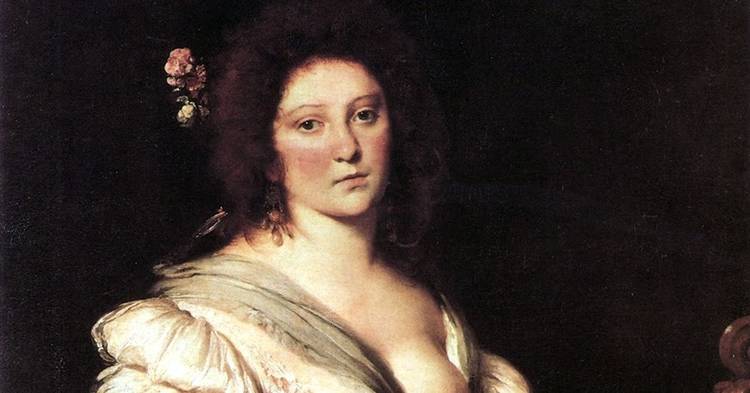


For some time now, through various collaborations, NYU Casa Italiana Zerilli-Marimò [2] has been exploring the theme of gender in Renaissance and Baroque Italy and particularly the representation (or lack thereof) of the women who contributed to shaping the cultural landscape of the time.
“I Sacri Musicali Affetti”, a concert organized alongside Salon Sanctuary Concerts [3], brings attention to the works of the prolific yet virtually unknown singer and composer Barbara Strozzi [4] 400 years from her birth.
The concert, which will be held on May 10th in Manhattan’s St. Francis Xavier Church [5] on West 16th street, will be performed by six female artists coming from different parts of the world, including Italian mezzo-soprano Elena Biscuola. The other performers will be soprano Jessica Gould, Paula Chateauneuf and Catherine Liddell (theorbo), Christa Patton (baroque harp), Katie Rietman (baroque cello), and Caitlyn Koester (chamber organ.)
We spoke with Ms. Biscuola to find out more about her and discuss her passion for Baroque music and the importance of celebrating the often forgotten or overlooked work of the remarkable women of that period such as Barbara Strozzi.
Can you tell us a little bit about yourself? Where are you from? Where did your passion for music come from?
I come from Monselice, a small town with an interesting history and beautiful landscape. I love the place where I live and the possibility to be in contact with nature while also being very close to Padova [6], a seat of Italian Art History, home to the Scrovegni Chapel, to one Italy’s oldest universities, and to the resting place of both Saint Anthony and of the great Barbara Strozzi herself.
My passion for music began when I was 6 years-old thanks to my family, who always made me listen to classical music, from Beethoven to Mozart, and especially Vivaldi. Thanks to Vivaldi I developed a passion for the Baroque right from the start, even though I initially dedicated myself to the study of piano and then successively at 14 I had the chance to sing in the chorus of the musical institute I was attending and to get closer to Renaissance and Baroque music. In that moment I decided I would only be happy if I became a singer. So at 18 I enrolled in the conservatory where I studied lyric singing, then chamber music, and finally baroque singing. And I have been working with Baroque ever since.
You perform at many concerts and events all over the world, is there one that was particularly significant to you? Do you have a favorite piece?
I had the chance over the years to tour Europe and America, including North (United States), Central (Mexico), and South (Argentina and Chile) and each place has left a positive mark. Of course, in European classical music festivals, such as the ones in Bruges, Utrecht, Gent, Ambronay and Royaumont you breathe classical music every day and have the chance to make interesting encounters and cultural exchanges that would otherwise be more difficult to come across, but in the United States, where I have had the chance to go on long tours, I encountered such love and curiosity for both Italy and classical music that I was deeply touched.
Throughout my career I sang much unpublished music that was discovered in Bolognese and Venitian archives and I have to say that I love discovering and giving voice to “hidden” music, but I also gladly sing Vivaldi, Monteverdi, Porpora, Haendel, Pergolesi, ect.
Pergolesi’s “Stabat mater” is probably the piece I have sung the most in all my life and every time I learn something different and fascinating, even though my main inspiration remains Bach for his genius and originality.
And what about the upcoming concert, “I Sacri Musicali Affetti”? Were you already familiar with the work of Barbara Strozzi?
I’m very happy to be able to sing this collection by Barbara Strozzi, of which I knew about but had never had the chance to study. I like her idea of exalting certain saints and of giving voice to their emotions. For example, the story of Saint Peter incredulous in front of Jesus walking on water, or even the final montetto dedicated to Saint Anthony, which reveals itself as an ode to joy dedicated to the “Santo” with multiple melisma on the words “cantate” and “Sancti Antoni.”
I’m very thankful to Jessica Gould for this opportunity and for the commitment and love that she has towards Italian music. I’m also thankful because before this project, she had also given me the chance to sing another piece by Strozzi, “Lacrime mie”, an absolute masterpiece of 17th century Italian music, with orientalizing tones and harmonic audacity.
Despite having been one of the most prolific composers of her time, Barbara Strozzi’s work has remained fairly unknown up to now, why do you think that is?
Regarding the lack of interest on the part of musicologist for “I Sacri Musicali Affetti” I think there might have been some reserve in considering this “sacred” music because it is vaguely erotic in its construction and very bold harmonically, which was unusual for the time.
The word “affetti” (affections) had however already been used, even by Monteverdi, and was tied not only to religious feeling but also to the affection and passion for art, music, spirituality. Affection is a passion of the soul, a desire for good and hatred of evil.
Why is it important to “bring back” and celebrate her work today?
I think it’s important to celebrate Barbare Strozzi for her courage and originality. Along with Francesca Caccini, they were the only women at the time who were able to compose, even in alternative ways, in a world that was exclusively male.
Source URL: http://ftp.iitaly.org/magazine/focus/art-culture/article/celebrating-baroque-composer-barbara-strozzi-interview-elena
Links
[1] http://ftp.iitaly.org/files/barbarastrozzi1jpg
[2] http://www.casaitaliananyu.org/
[3] https://www.sscconcerts.org/
[4] https://en.wikipedia.org/wiki/Barbara_Strozzi
[5] https://sfxavier.org/
[6] https://en.wikipedia.org/wiki/Padua